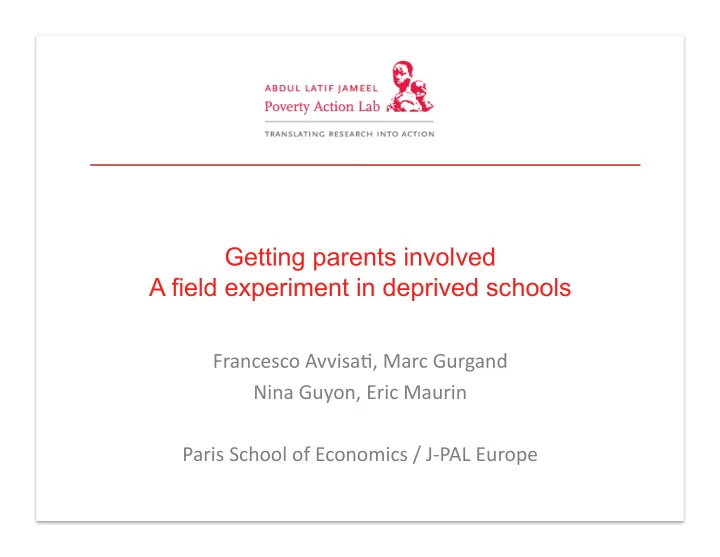

Getting parents involved A field experiment in deprived schools Francesco Avvisa-, Marc Gurgand Nina Guyon, Eric Maurin Paris School of Economics / J‐PAL Europe
Mo-va-on ► Significant differences in parental involvement across families with different social status ► Any causal rela-onships between the rela-vely good performance at school of pupil from rich families and the rela-vely strong involvement of their parents?
Ques-ons Is it really possible to improve parents’ involvement ? Has increased parental involvement any effect on children? Does the effect on program par-cipants spread out on other families? ► Specific importance of spillovers as only a minority of families volunteer to par-cipate in such a program TRADUIRE LA RECHERCHE EN ACTION
A randomized evalua-on 1. Iden-fy volonteer parents in all the schools 2. Within each school, randomize half classes 3. Only volonteer parents in treated classes are invited to the mee-ngs ► Ensures that families in treated and control classes are similar ► Significant differences by the end of the year are surely aTributed to the interven-on Impact causal des débats TRADUIRE LA RECHERCHE EN ACTION
Protocol: Four groups Treated Classes Control classes (randomized in) (randomized out) Volonteer Volonteer Compare Non Non volonteers Compare volonteers TRADUIRE LA RECHERCHE EN ACTION
Sample ► 37 middle schools, 200 classes, 5,000 6 th grade pupils ► 20% volonteers (slightly higher social background) ► Among volonteers, actual take‐up rate 57% TRADUIRE LA RECHERCHE EN ACTION
Data ► Parents : year‐end survey (response rate 80%) Individual appointments with teachers, par5cipate in parental organiza5on, understand local school, etc. ► Pupils : Normalized tests beginning and end of year + school level informa-on TRADUIRE LA RECHERCHE EN ACTION
Parental involvement TRADUIRE LA RECHERCHE EN ACTION
Parental involvement ► Increase about 10% to 30% of a standard‐devia-on ► Same order of magnitude as between white‐collar and blue‐ collar families ► Effect on parents translates into significant improvement in pupils’ behavior TRADUIRE LA RECHERCHE EN ACTION
Pupils’ behavior TRADUIRE LA RECHERCHE EN ACTION
Pupils’ behavior and cogni-ve outcomes VOLONTEERS NON‐VOLONTEERS Treated Control Treated Control Discipl. sanc-ons 7.0% 10.6% 8.9% 11.0% Honors 37.2% 34.5% 38.9% 34.1% ► French: +7% of s.d. for teacher marks and +8% of a s.d. for easiest items of external test ► No impact in Maths TRADUIRE LA RECHERCHE EN ACTION
Take away ► The programme has demonstrated effects on parental involvement and child behavior – to a smaller extent on cogni-ve achievement ► The behavior of all students in the selected classes improved, including those whose parents did not par-cipate TRADUIRE LA RECHERCHE EN ACTION
Policy implica-on ► Important issue but limited poli-cal ac-on ► Simple and inexpensive program ► Rigorous evalua-on: can convince schools or governments that such ac-on is worth taking ► Generaliza-on going on in France TRADUIRE LA RECHERCHE EN ACTION
Recommend
More recommend